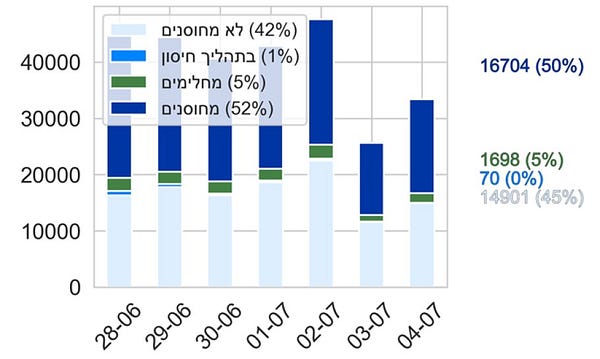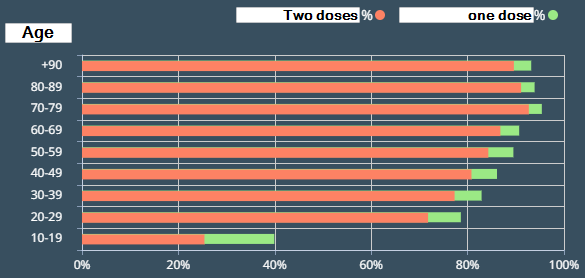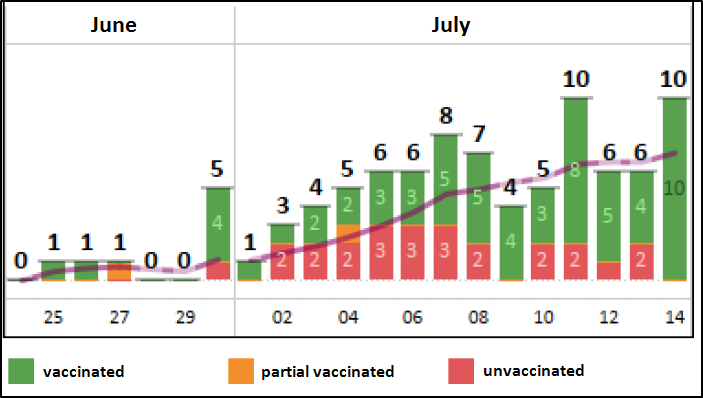Inside Israel's Delta outbreak part I: the data
Despite its vaccination success, Israel is seeing a new spike of the Delta coronavirus variant. Here's a look at the data. Warning: contains graphs
Let’s talk about Delta.
The Delta Variant of the Sars-CoV-2 coronavirus was discovered in India, and it’s the first major challenge to the global vaccination programme. A lot of the stuff we thought we knew about Covid-19 and vaccines is being tested in Israel as it faces a new wave of Delta infections.
Background
Israel is one of the most vaccinated countries in the world, thanks to an early deal with Pfizer. 90% of over-50s are vaccinated with two doses of the Pfizer vaccine.
Thanks to the vaccination programme, Israel’s infection rate plummeted to the point that the virus basically disappeared. From a peak of 10,000 cases a day in January, by late May the average number of daily cases was under 20, with a test positivity of less than 0.05%. Israel became the first country in the world to reach herd immunity from the coronavirus, and with almost all restrictions lifted, its Covid-19 pandemic was finally over.
And then Delta arrived.
Arrival
Theoretically, Israel had very tight border controls. In practice, quarantine wasn’t strictly observed, and of course vaccinated people (ie the vast majority of the adult population) were exempt. And so the Delta variant entered and started to circulate.
It started with school outbreaks. Someone who was supposed to be ‘in quarantine’ after travel to a red country sent his kids (who didn’t travel) to school, and Delta quickly spread among unvaccinated students and then on to vaccinated teachers. Then another school outbreak appeared in a different city. And a third.
The Israeli Health Ministry responding by a mass campaign to vaccinate 12-15 year olds, something they chose not to do when cases were very low. The government also reintroduced mandatory masks indoors, though with no enforcement and very patchy public compliance.
But virus rates continued to rise.
Who’s getting Delta?
Most of Israel’s new coronavirus infections are now people who have been vaccinated.
On 13 July, 399 vaccinated people tested positive for the virus compared to 320 unvaccinated people. And yesterday wasn’t special: that’s pretty much the pattern.
That difference becomes more pronounced once the 182 under-12s (who are all unvaccinated) are removed. Among the vaccine-eligible population, 70% of new cases yesterday were in vaccinated people.
Using these figures, Israel’s Health Ministry estimated that the Pfizer vaccine is only 64% effective against infection by the Delta variant, compared to the 95% effectiveness that the same methodology calculated for protection from Alpha infection back in May.
More worryingly, and more surprisingly, they said that the vaccine was only 64% effective at preventing symptomatic Covid-19 caused by Delta. That’s compared to the 97% protection they saw against Alpha.
However, the same study suggests that the vaccine is still 93% effective at preventing serious disease and hospitalisation, compared to 97.5% for Alpha.
The Health Ministry estimates were controversial, with some experts criticising the methodology for lacking an appropriate control group.
But it’s clear that Delta is spreading in Israel’s vaccinated population. Vaccinated people are getting Delta, and — critically — vaccinated people are giving Delta to other vaccinated people.
The key question, then, is how much of the spread is down to onward infection from vaccinated people, and how much relies on the pool of unvaccinated people. What is the Delta Variant’s R in a population where everyone’s vaccinated? I’m guessing we’ll end up with answers to that question from cruise ships and other closed environments, but we don’t know yet.
Who isn’t getting Delta?
Well, it’s hard to say for sure because of confounders in the data, but it looks like recovered people — people who had tested positive for the coronavirus in a past PCR test — are massively under-represented. Recovered people are around 9% of Israel’s population, but they’re less than 1% of current cases.
That has led to speculation that recovery from past Covid is more protective against infection from the Delta Variant than vaccination. Known recovered people in Israel are mostly not vaccinated, though some chose to get a single booster dose
There could be other explanations for this result. The Delta wave is, for now at least, not affecting the communities hardest hit by Israel’s previous Covid waves: Ultra Orthodox Jews and Israeli Arabs. So perhaps recovered people aren’t being exposed to the virus yet.
But I’m not sure that’s enough to explain the sharp difference. From data I was passed last week, recovered people were testing at only 0.1% positivity, compared to more than 1% for vaccinated people.


I wouldn’t be surprised if natural infection turned out to be more protective against variants than spike protein vaccination. It makes sense that the body’s immune system would find more ways to attack the whole pathogen and would recognise different parts of it compared to the changing spike in variants.
Of course, the whole point of vaccination is to be better than catching the disease. Catching Covid is a bad way to stop yourself from catching Covid.
Who’s being hospitalised?
You might have heard from other countries that “the vast majority of people hospitalised with Covid are unvaccinated”.
Well, that’s not true for Israel.
The graph below shows new severe cases of Covid-19 in Israel. In the last seven days, 73 vaccinated people and 9 unvaccinated people reached ‘severe’ hospitalised status.
This shouldn’t be surprising.
Even before Delta, the vaccines weren’t 100% effective against severe disease; they were around 95% effective. A vaccinated 80-year-old would still be at greater risk of severe Covid-19 than a healthy 30-year-old.
But it’s important that people understand that fact so they can assess their own risk when making decisions about what to do. Overly-bold claims about the effectiveness of the vaccines can lead people to relax more than they should and panic when they seen unexpected infections and hospitalisations. Better to be honest from the start that countries with high vaccination will see mostly vaccinated people getting ill from Covid.
Perspective
That graph from before showing the sharp rise in cases in July?
Here it is in full context, in the far right hand corner.
Israel’s rise in cases is not — yet— as sharp as the UK saw with Delta, perhaps due to the higher levels of vaccination in the population. Things can change fast, though.
Critically, too, the number of hospitalisations as a proportion of new cases is also down a lot. I don’t have accurate numbers for that, because the testing regime was so poor in June 2020 which is the most relevant comparator data, but the vaccines are absolutely keeping people out of hospital.
So that’s the data.
In Part II in the next couple of days, I’ll start to think about what it all means.
If you have any questions, comments or thoughts, write them here and I’ll try and answer some of them.











This was a much needed and informative article regarding vaccinations vs Delta. So much more of this and less of every other anecdotal thing forever. One would imagine after 2 months we'd be getting the same from UK's NHS, or USA's CDC, but alas they're keeping their infected vaccinated metrics close to the chest for political reasons, which hurts everyone. I do hope you update these numbers with your ongoing conclusions. Great work!
Great presentation, thank you for your hard work! Could you please share the graphic sources?